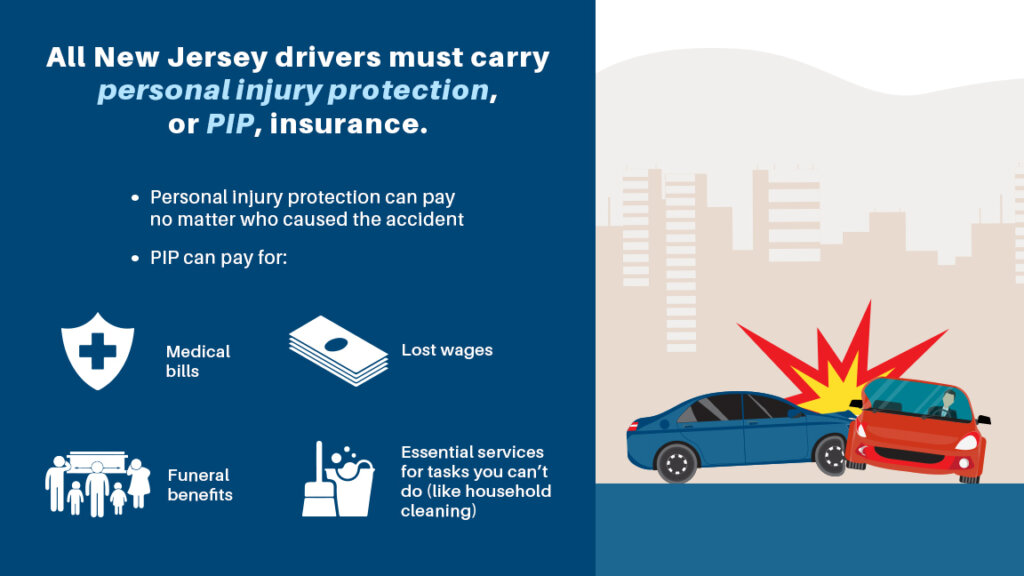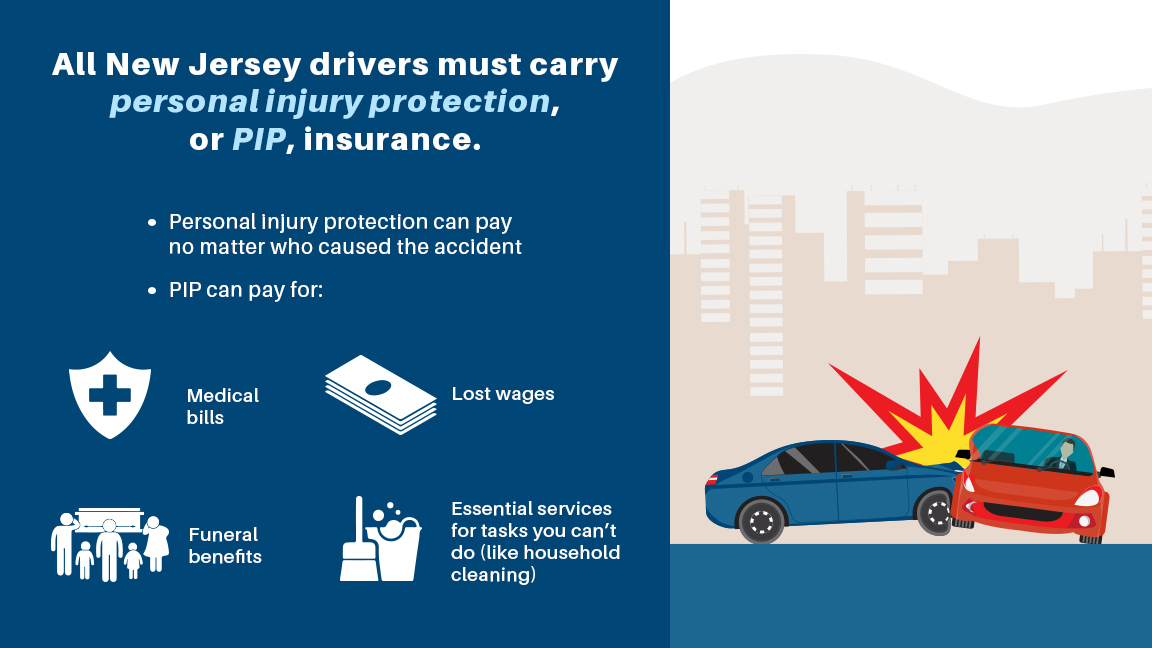One of the biggest concerns in any personal injury lawsuit is making sure the party at fault can pay for the damage. Winning a verdict doesn’t do an injured person any good if the wrongdoer doesn’t have the money to pay. To make sure that victims of car accidents are compensated, New Jersey requires all drivers to carry car insurance.
Although every state has a car insurance mandate, New Jersey’s differs in a few important ways. Unlike most states, New Jersey has a no-fault law, which requires drivers to carry insurance that covers their own injuries regardless of who was at fault for the accident. This law can also limit the types of lawsuits drivers can bring against others who injure them.
How Does No-Fault Coverage Work?
New Jersey statute 39:6A-4 requires all car insurance policies to include coverage for Personal Injury Protection (PIP), sometimes called Medical Expense Benefits (MEB). When an insured or their dependents are injured in a car accident, these benefits cover any medical bills, no matter who was at fault for the accident. This is different from the system most states use, where the insurer of the party at fault must pay for injuries caused by the accident.
It’s absolutely critical that anyone who lives in New Jersey and owns a car, buys car insurance. Anyone who does not maintain car insurance with the required PIP coverage cannot sue for any injuries suffered in a car accident, even if the other party was at fault. Additionally, driving without car insurance can lead to suspension of a driver’s license, fines, and jail time.
What Accidents Do Personal Injury Protection Benefits Cover?
PIP benefits cover a broad range of possible accidents. The statute establishing the no-fault requirement states that PIP benefits must cover personal injuries to the insured or his/her dependents “as a result of an accident while occupying, entering into, alighting from or using an automobile, or as a pedestrian, caused by an object propelled by or from an automobile and to other persons sustaining bodily injury while occupying, entering into, alighting from or using the automobile of the named insured, with the permission of the named insured..”
Essentially, this means the insured and their dependents are covered when they are injured in a car accident, whether or not they’re in a car during the accident. Courts have interpreted this to mean any accident that is a foreseeable consequence of using a vehicle is covered by PIP policies.
Courts have also applied this test to extend coverage to situations beyond an actual car accident. As the examples below show, PIP benefits are also available to carjacking victims, people injured in a tow truck that was towing their car, people examining the outside of their car for damage, and more.
Carjacking victims are entitled to PIP benefits. In Stevenson v. State Farm, the policyholder agreed to pick up a stranger late at night and drive him home. The stranger pulled out a gun and demanded that the policyholder get out of the car. After the policyholder panicked, the stranger shot him.
The court held that the plaintiff was entitled to the PIP benefits through his insurance policy because he suffered an injury caused in some sense by his car. Although carjacking is a deliberate crime, being carjacked is unintentional on the part of the driver. Carjacking is a foreseeable risk that arises from having a car, so the court reasoned that it falls within the scope of PIP benefits.
Someone injured in a tow truck accident might be entitled to PIP benefits. In Svenson v. National Consumer Ins. Co., a policyholder’s car broke down on the side of the road, so he called a tow truck. The tow truck got into an accident on the way to a mechanic’s shop, injuring the policyholder. The court required the insurer to pay PIP benefits because a car breaking down and needing to be towed is a foreseeable risk of using an automobile.
As shown in Ohio Casualty Corp. v. Gray, even a person injured while inspecting damage to their car might be entitled to these benefits. In this case, the policyholder got out of his car in a parking lot to check for damage after a strong wind blew a shopping cart into his car. While checking for damage and moving carts to make sure it wouldn’t happen again, another cart blew into the policyholder, causing him back injuries. Here, once again, the court required the insurer to pay PIP benefits because the injury arose from his attempt to drive out of the parking lot.
Considering how readily courts find that a PIP policy covers auto-related mishaps, it’s a good idea to check with a lawyer if an insurer denies a claim or offers a low payout. It may be possible to get a far larger payout by suing, or threatening to sue the insurance company.
What Will Personal Injury Protection Benefits Cover?
PIP benefits will only pay for what the law calls economic damages. That means PIP benefits cover medical bills and wages lost because the injured person cannot work, but they do not cover pain and suffering, loss of enjoyment of life, or other, less-easily measured types of damage. However, it may still be possible to recover these other types of damages from the party at fault. A personal injury lawyer can determine whether a lawsuit is worth pursuing, and the type of award one can expect to receive.
It’s important to note that PIP benefits have policy limits. The insurer is not required to pay anything over the policy limit, so medical bills over the limit will not be covered.

Can I Still Sue the Other Driver if I Have No-Fault Coverage?
Whether an injured driver can sue the person at fault for an accident depends on the injured driver’s car insurance policy. New Jersey law allows insurers to offer two types of policies: limitation on lawsuit (sometimes called verbal threshold or “limited tort”) and no limitation on lawsuit (or “full tort”). A driver with limitation on lawsuit coverage can only sue the person at fault for non-economic damages if the driver sustained permanent injuries. New Jersey defines permanent injury as:
- Death
- Dismemberment (loss of a limb)
- Significant disfigurement or scarring
- Displaced bone fractures
- Loss of a fetus, or
- Damage to a body part or organ that is not likely to heal within a reasonable degree of medical probability
Unlike with PIP benefits, a lawsuit against the person at fault for an accident can result in an award of non-economic damages like pain and suffering. While permanent injuries are sometimes obvious, such as death or the loss of a limb, courts have had to interpret exactly what might qualify as a permanent injury in other cases. Generally, someone claiming a permanent injury must provide a report from a doctor indicating that their injury is unlikely to fully heal.
Not every scar is significant enough to count as a permanent injury though, The Supreme Court of New Jersey refused to let a lawsuit for non-economic damages proceed when the only lasting injury was a scar that was practically invisible except in strong light. To qualify as significant, a scar or disfigurement must materially detract from a person’s appearance, according to the decision in Soto v. Scaringelli.
On the other hand, an injury can still be considered permanent even if it doesn’t seriously impact the victim’s life. In the DiProspero v. Penn case, the Supreme Court of New Jersey held that the law allows non-economic damages for permanent injuries and makes no mention of seriousness. Thus, it allowed a driver to sue over injuries that made chewing and strenuous physical activity more difficult but did not prevent her from attending college or performing ordinary daily chores.
When a person has been in multiple accidents, proving which accident caused which injury can be an issue. In Davidson v. Slater, a woman was in two car accidents several years apart. The Supreme Court of New Jersey allowed the woman to sue the driver in the more recent accident, but held that she would have to provide medical evidence to the jury showing that her injuries were caused by the more recent accident.
Finally, it’s important to note that the limitation on lawsuit only applies when someone is seeking non-economic damages. If PIP benefits are not enough to cover a person’s economic damages (like hospital bills or lost wages), the injured person may still sue the responsible party even if the injured person has the limitation on lawsuit coverage.
Uninsured/Underinsured Motorist Coverage
New Jersey law also requires insurers to offer uninsured motorist (UM) and underinsured motorist (UIM) coverage, though drivers are not required to buy it. This coverage can provide additional options to someone injured in a car accident if PIP benefits are unavailable or insufficient. UM and UIM benefits pay for bodily injury or property damage a person suffers as a result of an accident with a car that doesn’t have any or enough insurance to cover injuries.This coverage actually comes from the victim’s own insurance company, and can be triggered when the party at fault doesn’t have enough coverage to cover all of the victim’s damages.
Essentially, UM and UIM benefits pay out anything that a person at fault for an accident would have to pay out to cover damage. This includes any economic damage someone suffers that isn’t covered by PIP (such as if the damage exceeds the PIP policy limit), as well as non-economic damage. UM coverage also applies in hit-and-run cases because even if the driver has insurance, the injured person can’t access that insurance.
Why Do I Need a Lawyer if Insurance Covers Accident Injuries?
Although PIP insurance can cover medical costs, it’s still best to consult a lawyer to review your options. Car accidents can have far more consequences than just medical bills. Someone injured in an accident might suffer severe pain and suffering, disability, lost wages, emotional trauma, loss of the ability to engage in daily tasks (like housework), and more.
In many cases, these additional losses are far more significant than the medical bills. These losses can be both traumatic and financially costly. However, PIP benefits do not pay for these sorts of claims even if they’re within the policy limits, so the only way to get compensation is by filing a lawsuit against the driver at fault.
It’s also possible for medical bills to exceed the coverage limits of a PIP policy. Policy limits can be as low as $15,000. Given how costly medical care can be, especially for severe injuries, it’s very possible that PIP might not cover even the full medical costs, let alone other damages.
If your insurer denies PIP benefits, a lawyer can file a lawsuit to force them to pay. Additionally, an experienced personal injury attorney can determine whether you have a good case for non-economic damages that PIP benefits don’t cover. New Jersey has a two-year statute of limitations for personal injury actions (the amount of time you have to file a lawsuit), so make sure you contact an experienced attorney like Rosenblum Law as soon as possible to avoid losing out on filing a claim.
Who Should I Contact if I’ve Been Injured in a Car Accident?
If you’ve been injured in a car accident, contact Rosenblum Law for a free consultation today. Our experienced personal injuries know how to deal with insurance companies and will make sure to get the most possible compensation for you. Call 888-815-3649 or email us.







 888-815-3649
888-815-3649
